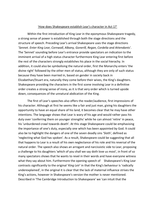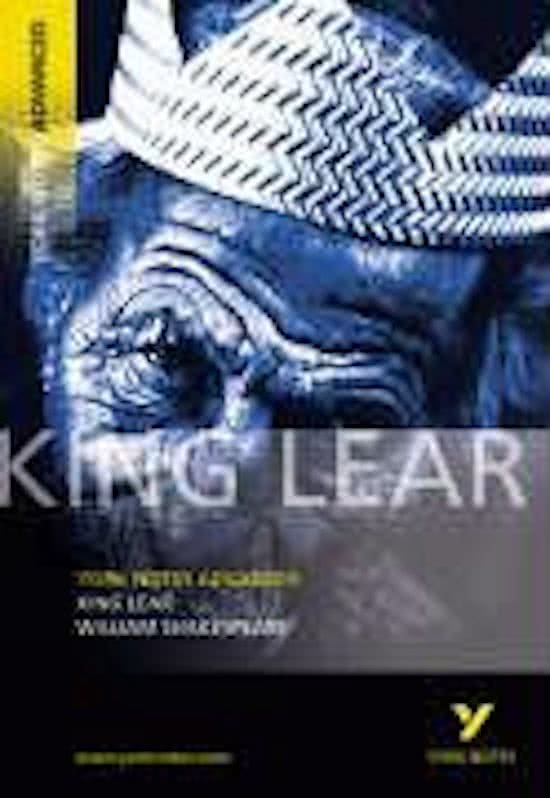'How does Shakespeare establish Lear's character in Act 1?'
Within the first introduction of King Lear in the eponymous Shakespeare tragedy,
a strong sense of power is established through both the stage directions and the
structure of speech. Preceding Lear's arrival Shakespeare uses the stage directions
'Sennet. Enter King Lear, Cornwall, Albany, Gonerill, Regan, Cordelia and Attendants'.
The 'Sennet' sounding before Lear's entrance provide spectators an indication to the
imminent arrival of a high status character furthermore King Lear entering first before
the rest of the characters strongly establishes his place in the social hierachy. In
addition, it could also be symbolising the natural order, first the Monarchy enters 'the
divine right' followed by the other men of status, although they are only of such status
because they have been married in, based on gender in society back in
Elizabethan/Stuart era, naturally they come before their wives, the King's daughters.
Shakespeare providing the characters in the first scene involving Lear in a definitive
order creates a strong sense of irony, as it is that very order which is turned upside
down, consequences of the unnatural abdication of the King.
The first of Lear's speeches also offers the reader/audience, first impressions of
his character. Although at first he seems like a fair and just man, giving his daughters the
opportunity to have an equal share of his land, it becomes clear that he may have other
intentions. The language shows that Lear is wary of his age and would rather pass his
duty over 'conferring them on younger strengths' while he can almost 'retire' in peace,
his 'unburdened crawl towards death'. At this stage Shakespeare could be emphasising
the importance of one's duty, especially one which has been appointed by God. It could
also be to highlight the dangers of one of the seven deadly sins 'Sloth', defined as
'neglecting what God has spoken'. As a result, Shakespeare could be suggesting that all
that happens to Lear is a result of his own neglectance of his role and his reversal of the
natural order. The speech also shows an arrogant and narcissistic side to Lear, proposing
a challenge to his daughters 'which of you shall we say doth love us most', in front of so
many spectators shows that he wants to revel in their words and have everyone witness
what they say about him. Furthermore the opening speech of Shakespeare's King Lear
contrasts significantly to the original 'King Leir' in that the King's behaviour is 'radically
underexplained', in the original it is clear that the lack of maternal influence strives the
King's actions, however in Shakespeare's version the mother is never mentioned.
Described in 'The Cambridge Introduction to Shakespeare' we 'can intuit that the





